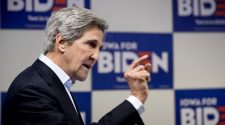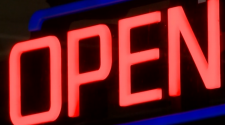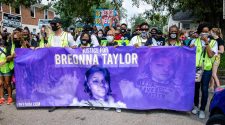The bill was suspended on June 18.
“On the 18th of June, I expressed my sincere apology,” she said. “The cause of these grievances are caused by the government. There are still lingering doubts about whether the government will restart the bill. There is no such plan. The bill is dead.”
While her language Tuesday was stronger, Lam’s position on the bill has not shifted since last month. After the bill was suspended, it was always going to die when the current parliament expires in summer 2020, along with all other outstanding legislation.
Protests are demanding an immediate and full withdrawal, guaranteeing that lawmakers couldn’t restart debates and rush the bill through to a vote.
Lam’s failure to announce that withdrawal Tuesday is unlikely to stop the mass marches that have disrupted the city in recent weeks.
Lam referenced several of those demands Tuesday, but not in a way likely to satisfy her critics. She said it was up to the Secretary for Justice whether to release arrested protesters and refused to call for an independent investigation into allegations of police brutality, instead promising that an existing police watchdog would fulfill this role.
As for resigning, she said stepping down from the role of chief executive “is not a simple task.”
“I still have the passion to govern Hong Kong,” Lam said. “I ask for Hong Kong people to give me the chance to continue to serve.”
It is unlikely that Lam’s resignation would bring stability to the city, as Beijing’s influence over the method of selecting the chief executive has previously led to major protests.
Hong Kong’s leader is chosen from candidates selected by a Beijing-dominated election committee and not freely elected by the people, a situation which sparked the 2014 Umbrella Movement protests.
Rights ‘under attack’
Ho told the UN Commission for Human Rights in Geneva that China had reneged on the commitments it made when it took control of Hong Kong in 1997, echoing the concerns of millions of Hong Kongers who have joined mass protests in recent weeks.
“The Vienna Declaration guarantees democracy and human rights. Yet in Hong Kong, these are under serious attack,” Ho said.
China’s delegation interrupted Ho’s speech twice by raising procedural motions. First, it accused Ho of violating the UN constitution by referring to Hong Kong as a country rather than a part of China and asked that she use “wordings that conform with UN rules.”
The Chinese diplomat used the second motion to accused Ho of “baselessly” attacking the “one country, two systems” arrangement under which the city is governed.
Ho ended her speech by asking the UN to convene an urgent session to “protect the people of Hong Kong” and remove China from the UN Human Rights Council.




















